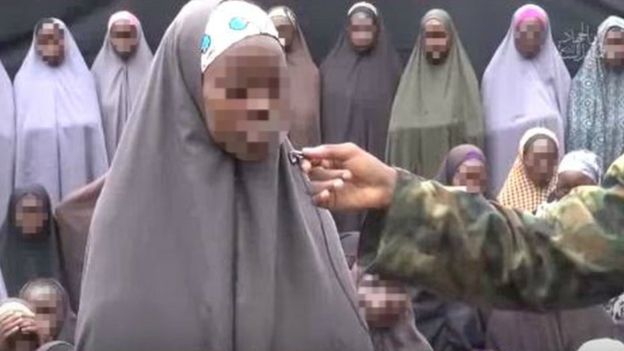Boko Haram fighters fleeing an attack on their base last week may have used some of the girls kidnapped in 2014 from northeast Nigeria’s Chibok as human shields to prevent being fired upon by fighter jets, a military commander said on Wednesday.
Major General Lucky Irabor, theatre commander of Nigeria’s military campaign against the group, showed a news conference aerial footage he said was filmed during the operation in the Sambisa forest that showed Boko Haram fighters moving with women and children.
“We had always believed and hoped that going into the Sambisa would afford us the opportunity to get the remaining Chibok girls. What we can’t tell is whether those women we can see were the Chibok girls,” he said.
Boko Haram militants kidnapped more than 200 girls from their school dormitories in the town of Chibok in April 2014. The first of the girls to be found said most of them were being held in the Sambisa forest, where she was discovered in May.
The group has kidnapped hundreds of men, women and children during its seven-year insurgency aimed at creating an Islamic state in northeast Nigeria, some of whom may also be held in the forest.
The abduction of the Chibok girls, 21 of whom were released in October, brought worldwide notoriety.
President Muhammadu Buhari said on Saturday the Islamist militants’ last enclave in the forest, the vast former game reserve in northeast Nigeria that was their stronghold, had been captured.
Reuters has been unable to independently verify that the area has been captured, but the comments from the general were the first reference by a military official to the suspected whereabouts of the girls since Buhari’s announcement.
The president said the capture of Camp Zero in the forest marked the “final crushing of Boko Haram” but security analysts say the group’s ability to carry out attacks in neighbouring Niger, Cameroon and Chad suggests it has multiple bases.
They also say the group split this year with one faction led by Abubakar Shekau operating from the Sambisa forest and the other, allied to Islamic State and led by Abu Musab al-Barnawi, based in the Lake Chad region.
Irabor said the military was pursuing those who fled, adding that 1,240 people suspected of being militants, their relatives or sympathisers had been arrested between Dec. 21 and 28.
Boko Haram has killed 15,000 people and displaced more than 2 million during its insurgency. It controlled an area the size of Belgium in early 2015 but has been pushed back by troops from Nigeria and neighbouring countries since then.
Separately, dozens of Boko Haram fighters have given themselves up to authorities in southern Niger, the interior minister there said.
